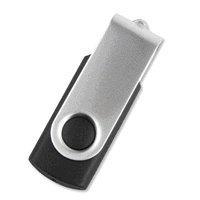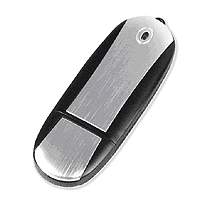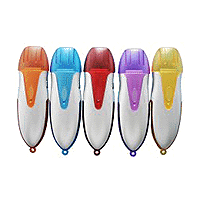 The most important component in any USB stick is of course the flash memory chip. These chips have the acronym EEPROM, which stands for electrically, erasable, programmable, read-only memory. As with all solid-state technology, the chips are relatively immune from damage by shock or vibration due to the lack of moving parts.
The most important component in any USB stick is of course the flash memory chip. These chips have the acronym EEPROM, which stands for electrically, erasable, programmable, read-only memory. As with all solid-state technology, the chips are relatively immune from damage by shock or vibration due to the lack of moving parts.
The chips come in a range of grades in respect of read, write speeds and data retention capabilities, and can be found in digital cameras and mobile phones as well as USB sticks. In addition, with their non-volatile nature, data retention is not reliant on a constant power supply. Other highlights include fast access times and low power consumption on a chip that on average lasts for close to 100,000 write cycles.
Quality is obviously an issue and Flash chips fall into four basic categories:
Original Branded Chips – Made by the leading well-known global producers and tested to high quality standards. These chips come with a full warranty, a unique serial number and are highly reliable.
OEM Chips – A discounted but equally reliable version of the above but without the branding or warranties.
Downgraded Chips – Rejects from the main manufacturer’s QA process purchased by third parties. A cheaper option but with a higher failure rate.
Fake Chips – Low capacity chips, often of a downgraded variety, reprogrammed to report much higher memory capability and sold as such.
Let’s concentrate more on the Fake Chips that are prevalent in the USB marketplace.
Like all fakes flooded onto the market by crooks looking to make a fast buck, USB flash drives appeal to anyone keen on a bargain. Memory after all costs money and so a large chunk of capacity for half the normal price is often hard to resist. Resist however is the key word here as anyone buying one of these “knock down” memory sticks will not only result in disappointment but could also lose more than the money they paid for it.
It’s a simple scam but packaged to look genuine, can fool even the more experienced user as they have been sold via eBay.
The basic con is that lower capacity flash chips, often those of 2 GB, are re-programmed to falsely report a much higher capacity, very often 68 GB. With an unfortunate user already taken in by the packaging, plugging the flash drive into their computer will only help to fool them into believing they have a bargain, but only for a time.
With a re-programmed chip at the core of the scam, a user will be blissfully unaware of the problem until the real capacity of the drive is exceeded. Windows properties for instance will report the capacity of the fake drive as stated on the fake box giving a user plenty of confidence to save more and more data to it.
Once the real capacity is exceeded the good news stops and anyone unfortunate enough to find themselves in this position can look forward to one of three things; a failed write, a frozen flash drive or complete corruption of the files that were already stored.
 Of course, there is software out there to test the capacity of USB flash drives, such as a german-developed program called “H2testw 1.4”, but such a scenario would require a conman’s agreement and that would be highly unlikely. It is also possible in some cases to reprogram the drive back to its original state and at least have something to show for the money spent but this too can be a fruitless exercise. Some reports of fake flash drives highlight the fact that the chips used are often low-grade factory rejects anyway and so the problem takes an even more sinister turn.
Of course, there is software out there to test the capacity of USB flash drives, such as a german-developed program called “H2testw 1.4”, but such a scenario would require a conman’s agreement and that would be highly unlikely. It is also possible in some cases to reprogram the drive back to its original state and at least have something to show for the money spent but this too can be a fruitless exercise. Some reports of fake flash drives highlight the fact that the chips used are often low-grade factory rejects anyway and so the problem takes an even more sinister turn.
In order to avoid being the victim of this scam, a prospective buyer should bear a couple of things in mind. If it appears an unbelievable deal then it probably is and where is the guarantee/warranty paperwork? Buying from a reputable dealer with paperwork to fall back on will not only save money in the long run, it will also prevent sensitive and valuable data from being lost.
Ellie Parker works in PR and currently writes on behalf of the Bespoke USB team. Bespoke USB specialises in branded USB sticks and other USB products. Visit today for a quotation: http://www.bespokeusb.co.uk/

